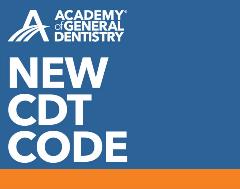AGD Submits Request for New CDT Code
 AGD’s Dental Practice Council (DPC) has submitted a request to the American Dental Association’s (ADA’s) Code Maintenance Committee (CMC) for a new code to be added to the Code on Dental Procedures and Nomenclature (CDT Code).
AGD’s Dental Practice Council (DPC) has submitted a request to the American Dental Association’s (ADA’s) Code Maintenance Committee (CMC) for a new code to be added to the Code on Dental Procedures and Nomenclature (CDT Code). The suggested nomenclature for the proposed new code is “Retorquing implant screw per screw,” with the descriptor of “Retorquing of a loose screw, which is a component of an implant prosthesis.” The procedure’s technical description reads: “Retorquing of an existing screw in an implant prosthesis, which can include but is not limited to an implant-supported crown or bridge, an abutment-supported restoration and intermediary abutment screws,” with the suggested clinical scenario noting cases when the “patient presents with a loose implant-supported crown and removal of the access opening materials is needed to locate the screw and for retorquing.” The submission notes that, currently, there is not a code that accurately describes retorquing of a screw within an implant prosthesis. One important reason is to record the number of times a screw is retorqued, so this can be taken into consideration when deciding if it can be retorqued or if it needs to be replaced. Allowing for a location of the prosthesis to be linked to the code allows for accurate recordkeeping.
The proposal will be discussed and voted on by the CMC at its meeting March 9–10, 2023.
The CMC meets annually to discuss and vote on proposed changes to the CDT Code. Decisions under the CMC’s purview consist of adding new nomenclatures and descriptors, revising existing nomenclatures or descriptors, and deleting full CDT Code entries (nomenclature and descriptor or descriptor only). AGD is one of the 19 members in the organization that votes on the recommendations. The AGD’s voting member and delegate to the CMC is Ralph A. Cooley, DDS, FAGD, of AGD’s Legislative & Governmental Affairs Council; Arlene O’Brien, DMD, FAGD, of the DPC, is AGD’s alternate to the CMC. Each year, both representatives review each suggested code change and offer independent recommendations. The DPC then discusses those recommendations and determines what stance AGD should take in response to each code action request.
In 2022, the CMC approved 29 new codes, revised one category of service descriptor and the nomenclatures or descriptors (or both) for 13 codes, and deleted two other codes. The 29 new codes included seven COVID-19 vaccination procedure codes that were considered part of CDT 2022. The status of AGD’s submission will be communicated once the official actions of the 2023 CMC meeting are reported.
AGD members interested in requesting changes to the CDT Code are encouraged to visit ada.org/cdt and review the information on that page, including the information relating to “Request a Change to the Code.” That resource includes instructions and the forms that must be completed in order to request a change. Members interested in requesting that the AGD review, or possibly endorse, their recommended change to the CDT Code should submit that information via email to dentalpractice@agd.org as soon as possible, preferably by April 1. The AGD’s DPC will review the information, offer feedback, and advise whether the organization is able to take an official position. Code Action Requests received by the CMC by Nov. 1 will be considered at the CMC meeting the following March.
